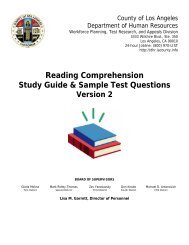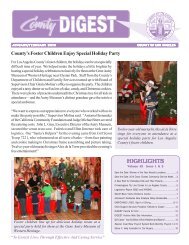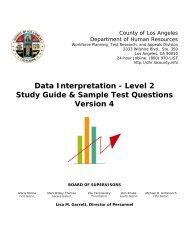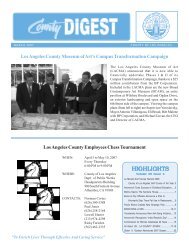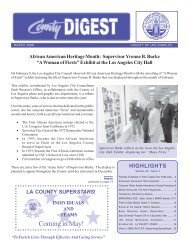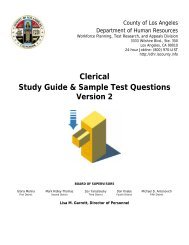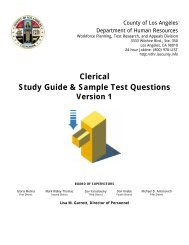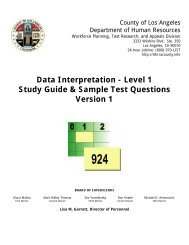Written Expression Study Guide & Sample Test Questions ... - La.ca.us
Written Expression Study Guide & Sample Test Questions ... - La.ca.us
Written Expression Study Guide & Sample Test Questions ... - La.ca.us
You also want an ePaper? Increase the reach of your titles
YUMPU automatically turns print PDFs into web optimized ePapers that Google loves.
Answers and Explanations to <strong>Written</strong> <strong>Expression</strong> Items<br />
1. An error is found in part C of the sentence. The sentence should read, Though the procedure<br />
applies to all departments, the Fire Department has modified it. In part C, “department” should be<br />
<strong>ca</strong>pitalized to reflect that a specific department is referenced.<br />
2. An error is found in part B of the sentence. The sentence should read, Detailed information<br />
regarding open positions is available on our website. In part B, “are” is the incorrect verb form for<br />
the singular subject of “information.”<br />
3. There is no error in the sentence; therefore, D is the correct answer.<br />
4. An error is found in part B of the sentence. The sentence should read, After a year of retirement,<br />
your former supervisor is returning to work as a consultant. In part B, “you’re” means “you are”<br />
and is not the possessive adjective required to modify “supervisor.”<br />
5. An error is found in part A of the sentence. The sentence should read, He, too, is considering<br />
transferring divisions in order to have a shorter commute to work. In part A, “to” is a preparation<br />
denoting direction and should be “too” as in also.<br />
6. Sentence B is most accurate. Choice “A” is improperly structured (i.e., “to walk” should be<br />
“walking”), “C” contains an unnecessary possessive (i.e., “persons’” should be “persons”), and “D”<br />
contains an ambiguo<strong>us</strong> reference (i.e., “After training for more than one year”).<br />
7. Sentence C is most accurate. Choice “A” contains an incorrect verb tense (i.e., “issue” should be<br />
“issued“), “B” contains an incorrect pronoun (i.e., “it” should be “they”), and “D” contains an<br />
ambiguo<strong>us</strong> reference (i.e., “While typing”).<br />
8. Sentence C is most accurate. Choice “A” contains a mis<strong>us</strong>ed word (i.e., “hear” should be “here”),<br />
“B” contains a mis<strong>us</strong>ed word (i.e., “myself” should be “me”), and “D” contains an incorrect verb<br />
form (i.e., “was” should be “were”).<br />
9. Sentence A is most accurate. Choice “B” contains an unnecessary adjective (i.e., “more”), “C”<br />
contains improper verb forms (i.e., “own” and “administer” should be “owns” and “administers”),<br />
and “D” is missing necessary possessive punctuation (i.e., “divisions” should be “division’s”).<br />
10. Sentence C is most accurate. Choice “A” contains a double negative (i.e., “not never”), “B”<br />
contains unnecessary punctuation (i.e., “:”), and “D” contains a misplaced modifier (i.e., “Aged,<br />
blind, and disabled”).<br />
11. Sentence B is most accurate. Choice “A” contains incorrect possessives (i.e., “Josephines’ and<br />
Marias’” should be “Josephine’s and “Maria’s”), “C” contains a misplaced modifier (i.e., “weighing<br />
150 pounds”), and “D” contains a mis<strong>us</strong>ed word (i.e., “they’re” should be “their”).<br />
12. Sentence D is most accurate. Choice “A” contains a misplaced modifier (i.e., “frequently”), “B”<br />
contains an incorrect article (i.e., “a” should be “an”), and “C” is missing necessary punctuation<br />
(i.e., “program” should be “program,”).<br />
13. Sentence B best expresses the common thought. In choices “A” and “C,” the adjective “all” is too<br />
far way from the noun that it modifies (i.e., “men, women, and children”), th<strong>us</strong> splitting up the<br />
subject of the sentence, “all men, women, and children,” and compromising clarity. Choice “D” is<br />
awkward in that it does not follow the generally accepted sentence construction of the subject<br />
being followed by the verb, and instead places the verb (i.e., “are fully considered”) before the<br />
subject (i.e., “all men, women, and children”).<br />
6



